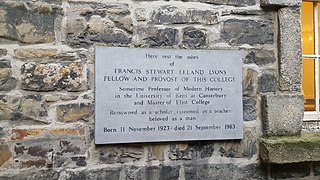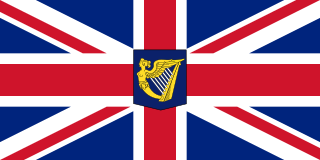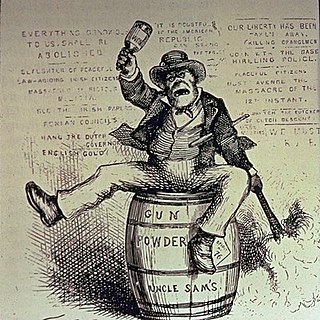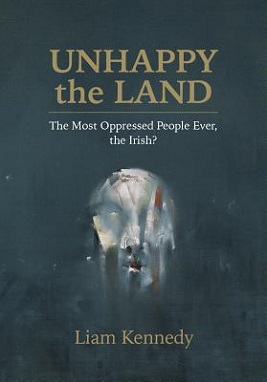Related Research Articles

The Great Famine, also known as the Great Hunger, the Famine and the Irish Potato Famine, was a period of starvation and disease in Ireland lasting from 1845 to 1852 that constituted a historical social crisis and subsequently had a major impact on Irish society and history as a whole. The most severely affected areas were in the western and southern parts of Ireland—where the Irish language was dominant—and hence the period was contemporaneously known in Irish as an Drochshaol, which literally translates to "the bad life" and loosely translates to "the hard times". The worst year of the famine was 1847, which became known as "Black '47". During the Great Hunger, roughly 1 million people died and more than 1 million more fled the country, causing the country's population to fall by 20–25% between 1841 and 1871. Between 1845 and 1855, at least 2.1 million people left Ireland, primarily on packet ships but also on steamboats and barques—one of the greatest exoduses from a single island in history.

Ireland is an island in the North Atlantic Ocean, in north-western Europe. It is separated from Great Britain to its east by the North Channel, the Irish Sea, and St George's Channel. Ireland is the second-largest island of the British Isles, the third-largest in Europe, and the twentieth-largest in the world.

Francis Stewart Leland Lyons was an Irish historian and academic who served as the 40th Provost of Trinity College Dublin from 1974 to 1981.

The legacy of the Great Famine in Ireland followed a catastrophic period of Irish history between 1845 and 1852 during which time the population of Ireland was reduced by 50 percent.

Ireland was part of the United Kingdom from 1801 to 1922. For almost all of this period, the island was governed by the UK Parliament in London through its Dublin Castle administration in Ireland. Ireland underwent considerable difficulties in the 19th century, especially the Great Famine of the 1840s which started a population decline that continued for almost a century. The late 19th and early 20th centuries saw a vigorous campaign for Irish Home Rule. While legislation enabling Irish Home Rule was eventually passed, militant and armed opposition from Irish unionists, particularly in Ulster, opposed it. Proclamation was shelved for the duration following the outbreak of World War I. By 1918, however, moderate Irish nationalism had been eclipsed by militant republican separatism. In 1919, war broke out between republican separatists and British Government forces. Subsequent negotiations between Sinn Féin, the major Irish party, and the UK government led to the signing of the Anglo-Irish Treaty, which resulted in five-sixths of the island seceding from the United Kingdom, becoming the Irish Free State, with only the six northeastern counties remaining within the United Kingdom.
Donald Harman Akenson is an American historian and author. Notably prolific, he has written at least 24 book-length, scholarly monographs, 4 jointly-authored scholarly books, 6 works of fiction and historical fiction, and 55 scholarly articles. He is a fellow of both the Royal Society of Canada and the Royal Historical Society (UK). He is also a Molson Prize Laureate, awarded for a lifetime contribution to Canadian culture. He was awarded a Guggenheim Fellowship in 1984, and in 1992 he won the prestigious Grawemeyer Award, then the richest non-fiction book prize in the world. Akenson received his B.A. from Yale University and his doctorate from Harvard University. He is Distinguished University Professor and Douglas Professor of History at Queen's University in Kingston, Ontario, Canada, and was simultaneously Beamish Research Professor at the Institute of Irish Studies, University of Liverpool (2006–10), and senior editor of the McGill-Queen's University Press (1982-2012).

The Royal University of Ireland was founded in accordance with the University Education (Ireland) Act 1879 as an examining and degree-awarding university based on the model of the University of London. A royal charter was issued on 27 April 1880 and examinations were open to candidates irrespective of attendance at college lectures. The first chancellor was the Irish chemist Robert Kane.

Anti-Irish sentiment includes oppression, persecution, discrimination, or hatred of Irish people as an ethnic group or a nation. It can be directed against the island of Ireland in general, or directed against Irish immigrants and their descendants in the Irish diaspora. This sentiment can also be called Hibernophobia.
Events from the year 1849 in Ireland.
Events from the year 1845 in Ireland.
Events from the year 1843 in Ireland.

The Ashfield Gales consisted of six generations of a Gale family who owned the Ashfield estate in Killabban Parish, Queens County, Ireland from the mid-17th Century until 1851.

Keith John Jeffery MRIA was a Northern Irish historian specialising in modern British, British Imperial, and Irish history.
Edna Longley is an Irish literary critic and cultural commentator specialising in modern Irish and British poetry.
Christine Kinealy is an Irish historian, author, and founding director of Ireland's Great Hunger Institute at Quinnipiac University. She is an authority on Irish history.
Mary Elizabeth Daly, is an Irish historian and academic. She is Professor of Modern Irish History at University College Dublin. From 2014 to 2017, she served as the President of the Royal Irish Academy.
Sean Joseph Connolly, is an Irish historian, initially specialising in the social history of Irish Catholicism in the late eighteenth and early nineteenth centuries, but more recently on post-Reformation and early modern Ireland and modern Belfast. From 1996 to 2017, he was professor of Irish history at Queen's University Belfast, and has been emeritus professor there since 2017. After completing his undergraduate degree at University College, Dublin, and his doctorate at the University of Ulster, Connolly worked as an archivist at Public Record Office of Ireland from 1977 to 1980, before spending a year lecturing in history at St Patrick's College, Dublin; he returned to the University of Ulster in 1981 as a lecturer and became a reader there in 1990. Connolly was also Vice-President of the Royal Historical Society from 2014 to 2016, and was twice editor of the journal Irish Economic and Social History.
Carla King is a lecturer at St Patrick's College, Dublin and an author in Irish history. According to Diarmaid Ferriter, she is "peerless in her expertise on Michael Davitt".

Unhappy the Land: The Most Oppressed People Ever, the Irish? is a 2016 book by Liam Kennedy, professor emeritus at Queen's University, Belfast. Kennedy introduces, as well as criticizes, the concept of "most oppressed people ever" (MOPE) to describe what he sees as a pervasive assumption both among Irish nationalists and the Irish diaspora that Irish people have been uniquely victimised throughout history. Throughout the book he plays devil's advocate while questioning many truisms he perceives as being commonly accepted about Irish history.
References
- ↑ "Members", International Network of Irish Famine Studies, Radboud University, Nijmegen
- ↑ IAPH
- ↑ University College Dublin Press
- ↑ "Irish Historian Dr. Peter Gray visits UNB", University of New Brunswick, November 12, 2015
- ↑ MacRaild, Donald. review of Famine, Land and Politics: British Government and Irish Society, 1843-50, Reviews in History, (review no. 173), February 2001